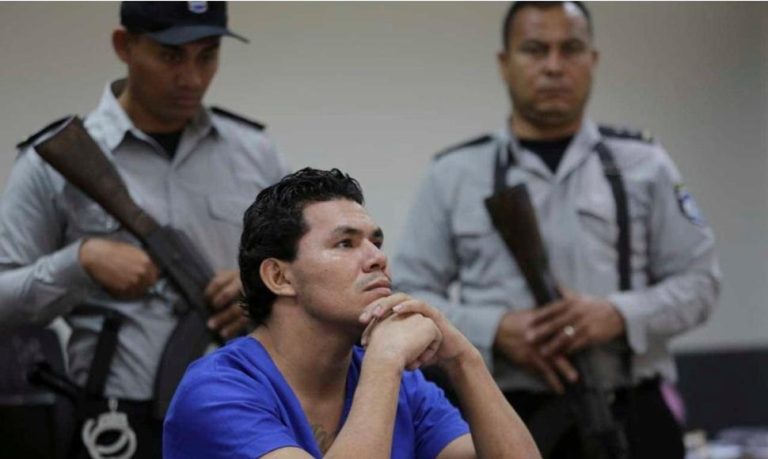25 de enero 2021

The Return of the Military

PUBLICIDAD 1M
PUBLICIDAD 4D
PUBLICIDAD 5D
District Attorney’s office now accuses of trafficking drugs in prison. Since his arrival in prison has remained is isolated in a maximum security cell

One day before political prisoner Carlos Alberto Bonilla was scheduled for release
One day before political prisoner Carlos Alberto Bonilla was scheduled for release, the District Attorney’s office issued a new accusation. On January 21, they officially accused him of drug trafficking while in prison, including narcotics, psychotropic drugs and controlled substances. In this way, they kept him from leaving jail, although he completed his full twelve-month sentence. Bonilla, in prison since January 21, 2020, now faces a new legal process. It will be his third “trial” in two and a half years.
Yonarqui Martinez, Bonilla’s lawyer, described the sequence of events. On Thursday, January 21, the Judicial Branch issued Bonilla’s release order. He had completed his 12-month sentence. Nevertheless, prison authorities failed to release him. The next day, Martinez decided to check the electronic system to see why Bonilla was still in the National Prison system. That’s how she discovered the new accusation.
Carlos Bonilla served his sentence in the La Modelo prison in Tipitapa. He’s one of the political prisoners who was kept in individual, maximium-security cells. The lawyer stated that it was “absurd” to imagine he could commit such a crime. “It’s difficult for me to believe that it’s true, and I’m going to continue maintaining that stance,” Yonarqui Martinez stressed.
According to the lawyer, the political prisoner “had already told his relatives that they wanted to keep him locked up.” Nonetheless, the court did issue a release order for him. At that time, “The accusation didn’t appear in the system,” Martinez indicated.
In mid-2018, amid the massive protests against the Ortega regime, Carlos Bonilla was arrested for the first time. He was accused of killing riot squad officer Hilton Rafael Manzanares Alvarado. He was also accused of attempted murder of four other police agents. Bonilla was sentenced to 90 years in prison. However, he only served 11 months of his sentence, due to the passing of the Amnesty Law in July 2019.
After his release, Bonilla was the victim of constant police harassment. He went into exile on September 8, 2019. In January 2020, he returned to celebrate his daughter’s birthday. One week later, he was arrested, accused, and sentenced to 12 months in jail for illegal firearms possession.
In the prison, Bonilla was kept isolated form the other prisoners. In June 2020, his family members denounced that he was experiencing symptoms of COVID-19 but wasn’t being given medical attention.
A new legal process against Bonilla is under presiding judge Nalia Naezdha Ubeda. The prisoner must remain in preventive detention until he goes before the court for the third time.
The new accusation against Bonilla recalls the case of Marvin Vargas, the Ortega regime’s longest-held political prisoner. Vargas was popularly known as “The Cub”. At one time, he was a committed Sandinista who led the movement “Sandino’s Cubs”, an organization of war veterans. He was arrested on May 8, 2011, through an operation of the National Police Special Forces. He was then transferred to the El Chipote interrogation jail.
Vargas was arrested for “terrorism”, but when the legal accusation was issued, it was for fraud. The plaintiffs who claimed he had defrauded and harmed them were people he didn’t know. Eventually, he was sent to the El Modelo prison in Tipitapa.
His detention came four months after a protest he spearheaded. He and his group used pressure tactics to demand the benefits promised to veterans but never received. Vargas then threatened to carry out military-style actions with his group.
Vargas was sentenced to five years and six months in prison. He spent this time confined in Gallery 300, known as “Little Hell”. After completing this sentence though, he wasn’t freed. First, he remained illegally imprisoned for six months. During this period, he was offered a conjugal visit.
Following the visit, he was then subject of an “operation”, during which they supposedly found drugs. He was then submitted to a new trial for internal narcotics trafficking and sentenced to 12 years in prison. In that way, his possibilities of freedom were cut off.
“In this perverse and cowardly way, they’ve been applying life sentences for a while in Nicaragua.” This was the conclusion of Vilma Nuñez, president of the Nicaraguan Human Rights Center (Cenidh). “It’s unpardonable that they’re accusing Carlos Bonilla of drug trafficking after he obtained his release order. It’s outrageous. It’s exactly the same thing they did to Marvin Vargas,” she emphasized.
This week, the Ortega regime legalized the possibility of life sentences in the country. The harsh sentences would supposedly be leveled against crimes of femicide, parricide, and aggravated murder. However, opposition leaders and human rights organizations see the law as a threat against those who oppose the Ortega regime.
Archivado como:
PUBLICIDAD 3M
Confidencial es un diario digital nicaragüense, de formato multimedia, fundado por Carlos F. Chamorro en junio de 1996.
PUBLICIDAD 3D